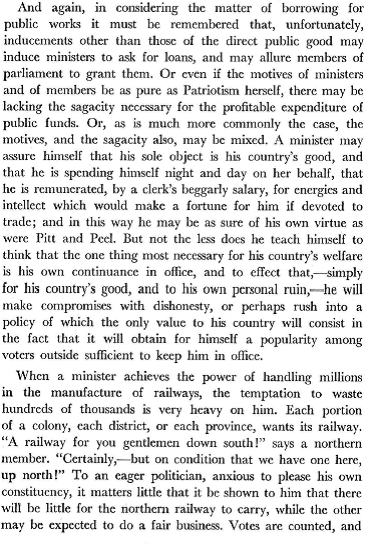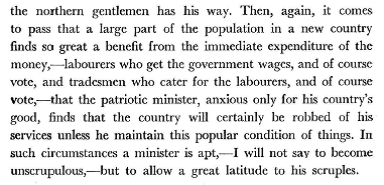Anthony Trollope, the great English novelist, was born 200 years ago last Friday.
He and his wife spent two months in New Zealand in 1872. Trollope recorded his observations and experiences in Australia and New Zealand. Large chunks of the New Zealand bits were republished in 1969 in With Anthony Trollope in New Zealand, edited by A H Reed. I’ve dipped into this book over the last few days, and reproduced a few of his observations on Anglican Christchurch here. His description of a visit to the, now long-lost, Pink and White Terraces is evocative and well worth reading
But Trollope also came to Wellington. Recall that the early 1870s was the prime of Julius Vogel, first as Colonial Treasurer and then as Premier, leading a heavy borrowing programme to finance large scale public works, railways, and immigration. Trollope’s time in Wellington coincided with a motion of no-confidence in Vogel moved in the House of Representatives by the former Premier Edward Stafford.
I don’t think Trollope could quite make up his mind about railways and New Zealand (not unexpectedly perhaps: he was a novelist from abroad and former public servant in the British Post Office). He repeats, and appears to accept, the oft-heard argument that New Zealand was different from Britain, and that government must be involved in marshalling the capital for railroads. He observes “nothing tends so quickly to enrich a country and to enable a people to use their wealth which God has placed within their reach, as a ready conveyance for themselves and their goods. But, faced with specifics, he also observes that a rail line to the “valley of the Hutt” appears of “questionable political economy”.
But Trollope really gets into his stride on the issue of incentives and (lack of) adequate disciplines once such works programmes are envisaged.
Logrolling, mixed motives, the self-delusions to which all office holders are prone, the lure of the immediate over the longer-term, it is all there. This, after all, was the man who was shortly to write the excellent The Way We Live Now.
How far has the analysis of rail in New Zealand moved on? The allure of rail seems to remain real in some quarters – and perhaps we all fall for it briefly any time we take, say, the Eurostar between Paris and London. One very senior public servant was heard to utter, not six years ago, in a serious discussion of New Zealand’s disappointing economic performance, his view that one of New Zealand’s great failings over its history had been under-investment in rail infrastructure – rail having been, he noted, one of the great legacies to the world of Victorian Britain.
The previous government bought back the rail company, and the current one seems to be pouring extraordinary amounts of money into the renamed Kiwirail. There is little sign that any very rigorous cost-benefit analysis is being done to evaluate the prospective expenditure and continuing operations at poor economic returns. Perhaps it is still too soon to tell, but I suspect that the continued heavy spending on an extensive rail network will prove a worthy candidate to add to a New Zealand list of blunders of our governments.

